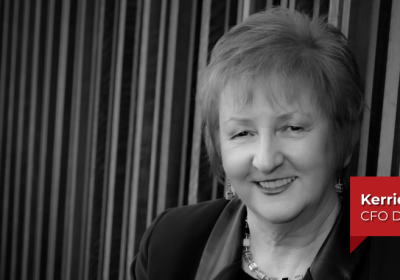
- Author: Tom Smith
- Posted: January 31, 2021
How CFOs are Leveraging the Power of Data to Guide Businesses to Post-Pandemic Recovery and Growth
Interview with Selena Verth, CFO | OFX
The role of CFOs has become more strategic than ever. Beyond directing the company’s financial actions, finance leaders are addressing a heightened need to dial-up predictability and certainty during several months of extreme market movements and what lies ahead.
Selena Verth is Chief Financial Officer at ASX-listed, OFX and keeping a cool head over the financial strategy is critical to navigating any uncertainty in the current operating environment. Thankfully, as a ‘grown up start-up’ that has been trading for over 20 years, they have many years of data to leverage in agile ways to guide the business forward. CFO Magazine had the opportunity to discuss with Selena some of the biggest challenges and opportunities facing CFOs in 2021.
Data as a guiding light during uncertainty
As a global organisation that provides international money transfer and payments services, data and insights are indispensable to how we do business.
As soon as we saw volumes significantly reduce post the record high currency volatility levels in March 2020, we sought out various data sets that enabled us to triangulate our response. By identifying previous currency cycles where we had seen similar behaviours, analysing our consumer and corporate client trading patterns and looking at economic data from events with similar global impact, such as the GFC and Brexit, we drew actionable insights and course-corrected in near real-time as fresh data became available.
As finance leaders, it’s essential to be a calming force in the business. Deriving clear insights from multiple data sources, mapping out potential scenarios, and continuing to test and learn to drive forward the best course of action, are essential skills to steering an organisation’s resources with a steady hand.
Response time in leveraging daily insights
Of course, data’s ability to facilitate business growth is only as good as a business’s agility to action relevant insights.
At OFX, the executives alongside our regional leaders in the marketing, risk and operations team have daily meetings to discuss what’s happening in each market. With this day-to-day data we can hypothesise on what’s driving these changes, adapt if need be and use fresh learnings to change the business’s trajectory.
Leveraging data in this way has a flow-on effect for our clients. As a business that moves money around the world, data on currency movements is key. Let’s say we identify a currency corridor that is trading exceptionally well. We can then send out an EDM within a few hours to clients who have traded in that currency corridor recently communicating this could be an opportune time to deal and we have solutions available to support them through the process.
As a finance team, we’ve also taken a more scientific approach when analysing data sets. For instance, conducting A/B testing for pricing strategies and having a continuous test and learn mindset can answer those all-important questions: “If it didn’t work, why not? What can we do differently?”. It’s then a matter of repeating and relearning to adapt these strategies to daily market movements to foster a more agile approach to supporting our clients and delivering value to the business.
Limiting risk to long-term growth
People can be tempted to make emotional business decisions during uncertain times; however, data is a powerful tool that can take the emotion out of connecting courses of action.
Stage-gating scenario exercises has been another data-led approach that enabled us to assure our stakeholders about growth pathways with predictability and certainty. Building projected cause and effect scenarios into business strategy helped our finance teams to provide not only expert advice on the direction the business should take, but also the pacing in which financial actions should roll out to minimise potential risk and maximise growth.
When building these stage-gating recommendations, knowing where reliable, repeatable income streams are can provide a strong foundation to secure cashflow confidence. As each scenario unfolds, it’s also worth embedding profit and social impact considerations into these strategies to help create a sustainable business.
Similarly, while each country has a different response to global events, economics and business trading patterns, having a diverse pool of markets to operate in and finding similar, stable patterns with replicable action plans can help safeguard your business. As a global organisation, limiting concentration risk by diversifying into new markets should also be a significant consideration when looking to facilitate long-term growth pathways.
Data-led thinking in the new normal
While early 2020 was an abnormal time, many organisations recognise this current operating environment as the new normal and are assessing how to best play on their business strengths and identify commercial opportunities.
From a business transformation perspective, there are several opportunities for data-led thinking to create more efficient processes and workflows in all areas of a business. More and more, we see finance teams work closely with other business functions like operations, marketing and sales and these combined skillsets are delivering impressive business value add.
To give a recent example, we recently created several efficiencies in a collaborative exercise between our marketing and finance teams by taking a collective look at how we spend our digital marketing budget, combined with our experts’ economic and customer behaviour data background. We may not have undertaken this several years ago, but it certainly indicates other ways finance teams can apply their expertise within the wider business moving forward.
As the business function that’s closest to the numbers, there is a clear role for finance teams to play in coaching the business on that journey and facilitating even greater business value.
Calm and collaboration
For CFOs and their teams, data and insights are invaluable tools for advising on the organisation’s recommended trajectory and maintaining a sense of calm that will flow throughout the wider business.
As we bed down ‘business as unusual’ following the pandemic’s initial impact and interactions between finance and other business functions grow, the path ahead for financial leaders becomes clearer. Combining the finance capabilities and data-led thinking with different skill sets within an organisation will enable financial professionals to have an even more decisive role to play in fostering cohesive business growth and adding value to the business now and in the future.
Meet the CFO:
Selena Verth, Chief Financial Officer | OFX
- Selena has more than 20 years of experience in finance, analytics, M&A and risk across various roles.
- Her most recent role was Head of Finance Platforms, Superannuation and Investments and Head of Wealth Analytics and Insight at BT Financial Group Australia
- Prior to this, Selena held a number of senior financial roles within GE.








